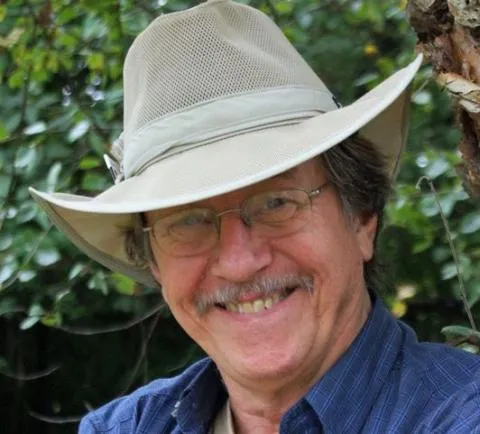Reaching Out to Help

A while back, I was about halfway through a busy Tuesday morning volunteer shift, greeting visitors, answering questions, and running the cash register. A young woman who had been standing back from the front desk came up to it and said, “They said I could use a phone here. I don’t know where I am and I’m kind of freaking out here.” Before I could answer a man standing nearby handed her his phone and, after she made a call, his wife came up and started talking to her. They walked out the door together. After I finished with the next group of customers, I saw the woman sitting down on the bench outside, and later the person who had helped her came back in and said, “Did he come and pick her up?” I assume she was able to make contact with someone, thanks to the kindness of a family of strangers.
Late that same evening my wife and I were on our way home from eating out when Suzanne said, “Stop the car!” A man was standing in the middle of the road; when I rolled down the window he said, “Can you take me somewhere?” At least I think that’s what he said; his speech was badly slurred. “Can you take me to sunrise?” he said, and kept on talking, but I could only understand some of what he said. We got him around to the passenger side so he wouldn’t get hit. Cars were few and far between on that road at that time of night, but even with my flashers on it was dangerous. We decided to put him in the back seat and try to figure things out from there.
He told us his name, said that he was brain damaged, and tried to give us directions, but they were contradictory and confusing. He couldn’t remember his age, couldn’t remember his own or his mother’s phone number, and we were becoming more and more worried about him. During his ramblings he mentioned one of the main state highways several times, so we took him there, to an intersection that had gas stations and convenient stores that were open, let him out and gave him some money. As we left, we called the police to explain where he was and what little we knew about his situation.
I was deeply troubled by these two seemingly unrelated events. It would be easy to dismiss it as coincidence or see it as a metaphor for the times or make it into some kind of political statement, but I don’t see it that way at all.
There are people moving through their lives right next to us who are scared, or hurting, or lost, or damaged in some significant way, and most of the time we don’t even notice. What happened to me yesterday was that two of those people came into view and presented me with a decision about whether or not to step into their world for a moment. We all have those decisions occasionally. Do we go to the aid of the attractive, frightened young woman in a brightly lit public area in broad daylight? How about the dirty, poorly dressed, barely articulate man stumbling around in the middle of a dark road late at night?
Some decisions are easier than others but, in any case, we fall back on whatever moral compass or set of principles or core beliefs that we live by to figure out what to do, and in that way, I guess the people in distress tell us as much about ourselves as they do about their own troubles. I know that fear is interfering with my moral compass a lot more than it used to; so far it hasn’t kept me from helping, and I guess that’s a good thing, but the thought of just walking on by does occur to me now and then.
Jim Hartsell lives on House Mountain in Northeast Knox County and is the author of the Boone Series, the story of an Appalachian teenager growing up with the odds against him and no family to help him out. You can get descriptions of each book in the series, order your own copies, and check out his other books at his website www.housemountainviews.com.
- Log in to post comments
Reaching Out to Help
Love this article, Jim. Maybe if we all reached out to help when we noticed someone in need the world could be so much better.
Cyn